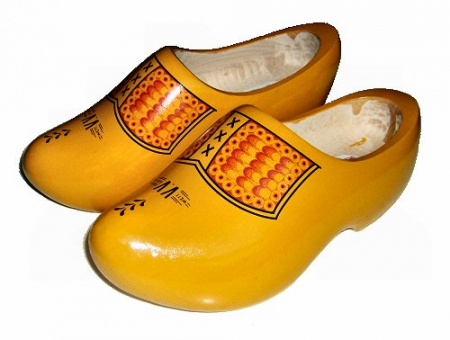Equity of redemption: Difference between revisions
Amwelladmin (talk | contribs) No edit summary |
Amwelladmin (talk | contribs) No edit summary |
||
| (9 intermediate revisions by the same user not shown) | |||
| Line 1: | Line 1: | ||
[[File:Dutch door mat.jpg|thumb|A | {{a|g|[[File:Dutch door mat.jpg|thumb|450px|center|A dutch door mat, or “terugkoopvermogen” yesterday]] | ||
[[File:Clogs.jpg|thumb|Some clogs yesterday]] | [[File:Clogs.jpg|thumb|450px|center|Some clogs yesterday]]}}The [[equity of redemption]] is a concept developed by the courts of chancery from an old Dutch {{t|metaphor}}. In the 19th century, a “''terugkoopvermogen''” was a multi-purpose brush mat. By tradition, a Dutch tulip farmer (or miller) expecting guests would lay one at the front door as a place for visitors to put their footwear when visiting. | ||
As long as there were visitors, the ''terugkoopvermogen'' could not be otherwise used: there were clogs on it. Once all the visitors had left, taking their [[clogs]] with them, the farmer was able to take the mat back and put it to a better use. | |||
This is possibly the worst joke on this whole wiki, and | The mistranslation occurred when mediocre librettist [[Otto Büchstein]] stayed with just such a farmer on his way visit King George. “''Terugkoop vermogen''” translates literally in English as “redemption equity”. | ||
By {{t|metaphor}} this was extended to the residual value of an asset to its pledgor once all liabilities against which it was pledged had been satisfied.<ref>Work with me here, okay? It is NOT EASY making light of this stuff.</ref> | |||
Hence the expression “Eey oop, my lover, put your [[Clog on the equity of redemption|clogs]] on the [[equity of redemption]] pet” and “Whooargh, he can put his [[Clog on the equity of redemption|clogs]] on my [[equity of redemption]] ''any time''.” | |||
This is possibly the worst joke on this whole wiki, and that’s saying something. | |||
{{sa}} | |||
*[[Otto Büchstein]] | |||
{{ref}} | |||
{{egg}}{{draft}} | |||
Latest revision as of 19:38, 24 February 2021
|
The equity of redemption is a concept developed by the courts of chancery from an old Dutch metaphor. In the 19th century, a “terugkoopvermogen” was a multi-purpose brush mat. By tradition, a Dutch tulip farmer (or miller) expecting guests would lay one at the front door as a place for visitors to put their footwear when visiting.
As long as there were visitors, the terugkoopvermogen could not be otherwise used: there were clogs on it. Once all the visitors had left, taking their clogs with them, the farmer was able to take the mat back and put it to a better use.
The mistranslation occurred when mediocre librettist Otto Büchstein stayed with just such a farmer on his way visit King George. “Terugkoop vermogen” translates literally in English as “redemption equity”.
By metaphor this was extended to the residual value of an asset to its pledgor once all liabilities against which it was pledged had been satisfied.[1]
Hence the expression “Eey oop, my lover, put your clogs on the equity of redemption pet” and “Whooargh, he can put his clogs on my equity of redemption any time.”
This is possibly the worst joke on this whole wiki, and that’s saying something.
See also
References
- ↑ Work with me here, okay? It is NOT EASY making light of this stuff.

